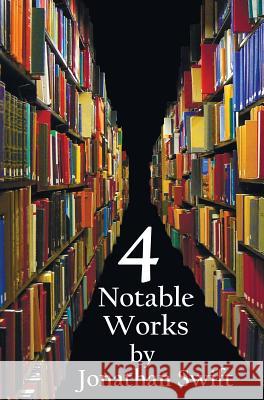Four Notable Works by Jonathan Swift (complete and Unabridged), Including: Gulliver's Travels, A Modest Proposal, A Tale of a Tub and The Battle of the Books and Other Short Pieces » książka
Four Notable Works by Jonathan Swift (complete and Unabridged), Including: Gulliver's Travels, A Modest Proposal, A Tale of a Tub and The Battle of the Books and Other Short Pieces
ISBN-13: 9781781393833 / Angielski / Twarda / 2013 / 456 str.
Four Notable Works by Jonathan Swift (complete and Unabridged), Including: Gulliver's Travels, A Modest Proposal, A Tale of a Tub and The Battle of the Books and Other Short Pieces
ISBN-13: 9781781393833 / Angielski / Twarda / 2013 / 456 str.
(netto: 242,01 VAT: 5%)
Najniższa cena z 30 dni: 252,02
ok. 16-18 dni roboczych.
Darmowa dostawa!
Jonathan Swift was an Anglo-Irish cleric, Dean of St. Patrick's, Dublin, satirist, essayist and political pamphleteer. Enjoy these four complete and unabridged books in a single volume. Gulliver's Travels: Gulliver travels to various previously undiscovered and fantastic worlds, enabling Swift to challenge, question, rebuke and poke fun at all manner of political, religious, social, scientific and philosophical groups, ideologies and dogma. Swift is scathing and witty, this work is one of shear caustic genius. A Modest proposal: This essay is considered by many to be the pinnacle of satire. It was written during the poverty and population crisis in Ireland, where Swift worked as Dean in Dublin, helping the most impoverished. The rich public's only solution was to forget about the poor because they didn't matter, so Swift offered this piece in juxtaposition. He suggested that the children should be sold for food, not only would selling their children solve the poverty crisis, but as they were being eaten by the wealthy that would also solve the over-population issue Hilarious satire at its best. A Tale of a Tub: This is Swift's first satirical work and is a commentary on the nature of religion and mankind, as well as taking a particular swipe at authors and their pride. Not an easy read, it has layers of parody and the diversions to the main story get longer and longer until they take over the book. Swift is deliberately asking the reader to ask whether there are deeper meanings within the text or whether it is all meaningless. The plot is based on three brothers: Peter represents the Roman Catholic Church, Jack represents Protestant Churches, and Martin represents the Lutheran church. The Battle of the Books and Other Short Pieces: More satirical fun. This book starts with a short story called "The Battle of the Books." Based on the disagreement in Swift's day as to which books were of most value - the ancient writers or the moderns, the books literally take up arms and battle each other in a hilarious parody of The Iliad.
Jonathan Swift was an Anglo-Irish cleric, Dean of St. Patricks, Dublin, satirist, essayist and political pamphleteer. Enjoy these four complete and unabridged books in a single volume. Gullivers Travels: Gulliver travels to various previously undiscovered and fantastic worlds, enabling Swift to challenge, question, rebuke and poke fun at all manner of political, religious, social, scientific and philosophical groups, ideologies and dogma. Swift is scathing and witty, this work is one of shear caustic genius. A Modest proposal: This essay is considered by many to be the pinnacle of satire. It was written during the poverty and population crisis in Ireland, where Swift worked as Dean in Dublin, helping the most impoverished. The rich publics only solution was to forget about the poor because they didnt matter, so Swift offered this piece in juxtaposition. He suggested that the children should be sold for food, not only would selling their children solve the poverty crisis, but as they were being eaten by the wealthy that would also solve the over-population issue! Hilarious satire at its best. A Tale of a Tub: This is Swifts first satirical work and is a commentary on the nature of religion and mankind, as well as taking a particular swipe at authors and their pride. Not an easy read, it has layers of parody and the diversions to the main story get longer and longer until they take over the book. Swift is deliberately asking the reader to ask whether there are deeper meanings within the text or whether it is all meaningless. The plot is based on three brothers: Peter represents the Roman Catholic Church, Jack represents Protestant Churches, and Martin represents the Lutheran church. The Battle of the Books and Other Short Pieces: More satirical fun. This book starts with a short story called "The Battle of the Books." Based on the disagreement in Swifts day as to which books were of most value - the ancient writers or the moderns, the books literally take up arms and battle each other in a hilarious parody of The Iliad.











